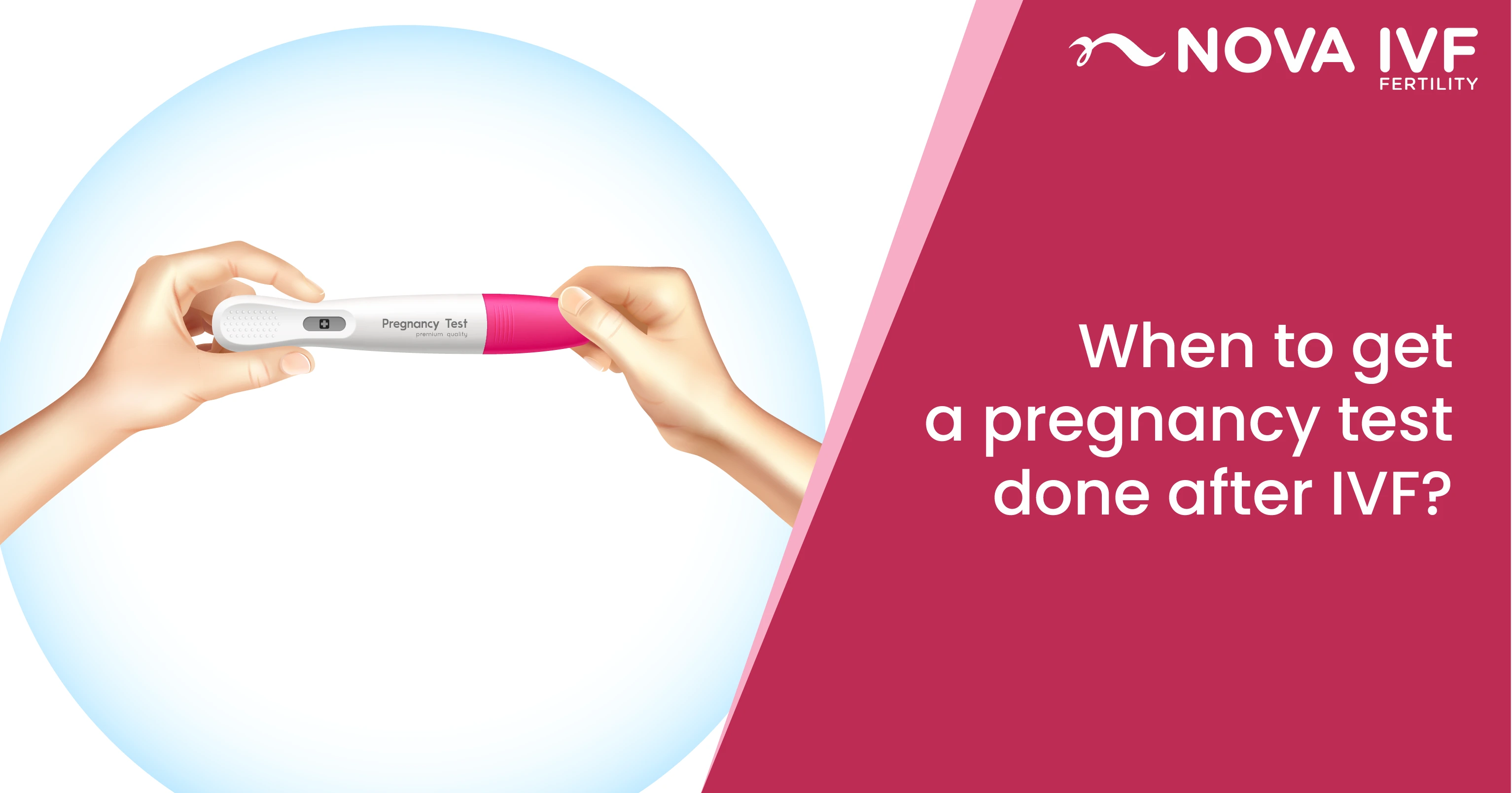How Soon to Take Pregnancy Test after Implantation

Families and couples from across the globe are eager to welcome and celebrate the ‘good news’ of their pregnancy, whether conceived naturally or through IVF. But many of them are unaware of the fact that they should take the pregnancy test. Is there a specific time one should do the pregnancy test? Yes, the pregnancy test needs to be done at least after the implantation has occurred. But the question is: how soon a pregnancy test can be taken after implantation? So, let's walk you through the facts step by step.
What is Implantation?
Implantation is the earliest sign of pregnancy, where the fertilised ova or egg attaches to the uterine lining (endometrium). This normally occurs 6-12 days after fertilization. It can be evident as minor bleeding or spotting, commonly called implantation bleeding. The colour of the bleeding can be somewhere from pink to brownish and usually lasts only for some time. However, not all pregnant women may experience implantation bleeding.
Anyone who is trying to get pregnant should take the pregnancy test after implantation.
What occurs during and following implantation?
For implantation to occur, fertilization of the egg and sperm is essential. Therefore, for the process of fertilization, the sperm has to travel through the uterus to the fallopian tube of the female reproductive system, where it reaches the egg released from the ovaries. Once the sperm has successfully travelled to the fallopian tube and fertilized the ova (egg), it slides from the fallopian tube and into the uterus (womb) via a narrow opening. The fertilized egg then buries itself in the uterine lining, called the endometrium.
The body’s responses vary based on whether the implantation occurs versus not. Once the egg discharges from the ovaries, the egg's shell remaining in the ovary, called the corpus luteum, begins to secrete a hormone named progesterone. Progesterone helps the lining of the uterus to prepare itself to receive and implant an egg. If implantation does not occur, the body's progesterone levels starts to fall, the uterine lining ruptures, and the woman gets her menstrual cycle.
On the other side, when implantation takes place successfully, the fertilized egg produces hCG. This alerts the woman about her pregnancy and also the corpus luteum to keep secreting progesterone so as to strengthen the uterine lining (endometrium).
Following this, some women may start to experience symptoms of implantation.
Common signs and symptoms of implantation
It is very common for expecting women to keep an eye on the implantation symptoms. However, it is important to note that not all women experience the signs and symptoms of implantation. Additionally, in some cases, even after implantation and embryo development have begun, the pregnant woman may experience none of the symptoms. However, in some circumstances, these early signs are false alarms. As a result, the most reliable method is taking a pregnancy test.
Here are some post-implantation symptoms:
- Elevated body temperature
- Mild cramping
- sore breasts
- Frequent urges to pee
- Mild bleeding or spotting
- Delayed or missed menstruation
How Soon After Implantation Bleeding Can You Take a Pregnancy Test
A small amount of the hormone hCG always exists in a woman’s body, irrespective of her pregnancy status. But after implantation, its levels shoot up. Pregnancy can be identified as soon as the levels of hCG are adequate to meet the test's sensitivity.
You can take a pregnancy test right away if you haven't already, especially after you notice implantation bleeding, which normally occurs around the time you expect your menstruation.
Some pregnancy tests can detect the hCG hormone in your urine just six days ahead of your missed period (i.e., about five days before your usual period). However, it is important to remember that if you test too early, you may have a false negative outcome because the levels of hCG can be too low to be detected even if you've become pregnant. If you receive a negative result but believe you are pregnant, wait another three days prior to testing again. HCG levels rise quickly in the early stages of pregnancy, which means you will likely receive a positive test if you have become pregnant.
It is important to remember that every woman has a different body; therefore, if you are not sure, it is best to consult a doctor.
Factors affecting the accuracy of a pregnancy test during implantation
Factors influencing the result of the pregnancy test during implantation bleeding may differ from individual to individual. One crucial factor is timing. It is critical to defer testing until the implantation bleeding occurs, because performing a test too soon can give false negative results.
Another factor to take into account is the level of sensitivity the pregnancy test. Certain test kits are more sensitive as compared to others, detecting even smaller amounts of hCG in blood or urine samples.
Individual factors such as hydration status and taking certain medications can also affect the reliable results of a pregnancy test. Drinking too many fluids before a test may dilute your urine, affecting the results. Certain medications, including diuretics or fertility treatments, may also cause inaccurate readings.
It is important to carefully follow the directions included inside your specific pregnancy testing kit. Not following the suggested waiting periods may result in incorrect results.
Taking into account these various factors whenever you are doing a pregnancy test during implantation bleeding can result in more reliable and precise results.
Other indicators of early pregnancy
Other early pregnancy signs to check for include breast changes. Women frequently report breast tenderness, sensitivity, or swelling. This has to do with hormonal alterations that take place during pregnancy.
You may also experience fatigue or increased tiredness. Your body has to work hard to keep up with the developing embryo, which may cause tiredness. Should you notice that you need a longer rest than normal or feel fatigued after a full night's sleep, you could be pregnant.
Some women experience vomiting and nausea, commonly known as morning sickness. However, this symptom is not limited to the morning; it can occur at any time of day.
Frequent urination can also be a symptom of early pregnancy. Hormonal changes increase blood flow to the kidneys and pelvic region, resulting in more urine production. If you find yourself going to the bathroom more than regularly without any other explanation, such as an infection or excessive liquid consumption, you ought to find out whether you are pregnant.
Some women may experience changes in mood or emotional disturbances in the early stages of their pregnancy. Hormonal variations can influence neurotransmitters.
When to visit a doctor
Implantation bleeding is normally not a cause for concern, but you should consult your healthcare professional if you suffer any bleeding during your pregnancy. Although minor bleeding during early pregnancy is quite normal, there are specific causes of bleeding that must be managed right away. These include infection, pregnancy loss, and ectopic pregnancy.
Different types of pregnancy tests
There are mainly two types of pregnancy tests:
Urine Pregnancy Test
This is usually a home-based test and detects hCG levels. It is recommended that you take the test a minimum of ten days following ovulation. If the test is negative, you can attempt the test again after a couple of days to verify the conception. If the results are positive, visit a doctor for a blood test.
Blood Pregnancy Test
Professionals typically perform blood-based pregnancy tests. These tests are more precise and reliable than urine tests. In most cases, the results will be positive 6 to 8 days following the conception.
Conclusion
While it can be tempting to take a pregnancy test as early as possible, understanding how soon after implantation you can take a pregnancy test is crucial, as this may affect the accuracy and reliability of the test and can cause unnecessary stress and anxiety. Understanding the process of implantation, the timing when you can take the pregnancy test, and the various test options available can help ensure that you receive accurate outcomes while offering clarity during your exciting but often anxious period.
FAQ
How soon can you take a pregnancy test after implantation?
You can take a pregnancy test 7 to 10 days after implantation. This time frame allows for the production of measurable quantities of the hormone hCG, which is used in pregnancy testing.
Do all women experience implantation bleeding?
No. Bleeding occurs in only some women in early pregnancies. In most situations, spotting is a typical indicator of implantation. Still, any form of bleeding should be investigated if you are concerned, as it could be a sign of an ectopic pregnancy or a miscarriage.
How much bleeding is considered safe during implantation?
Most of the time, implantation bleeding is not a concern. However, if you see any blood and have doubts, visit a doctor.
Can a pregnancy test be taken during implantation bleeding?
Yes, however, the accuracy of the test may vary depending on its sensitivity. Additionally, the hCG levels may also vary during the early pregnancy phases, affecting the results of the pregnancy test. Therefore, it is recommended that you perform the test at least 7-10 days after implantation has occurred.
 Infertility Counselling
Infertility Counselling Female Infertility Treatment
Female Infertility Treatment Andrology Treatment
Andrology Treatment Fertility Enhancing Surgeries - Female
Fertility Enhancing Surgeries - Female Fertility Enhancing Surgeries - Male
Fertility Enhancing Surgeries - Male Endoscopy Treatment
Endoscopy Treatment IUI Treatment
IUI Treatment IVF Treatment
IVF Treatment ICSI Treatment
ICSI Treatment Advanced IVF Solutions
Advanced IVF Solutions Embryology
Embryology Vitrification Egg, Embryo, Sperm Freezing
Vitrification Egg, Embryo, Sperm Freezing Preimplantation Genetic Testing (PGT)
Preimplantation Genetic Testing (PGT) Donation Program Embryo / Egg / Sperm
Donation Program Embryo / Egg / Sperm Self-cycleTM IVF
Self-cycleTM IVF

 Self-cycleTM IVF
Self-cycleTM IVF









